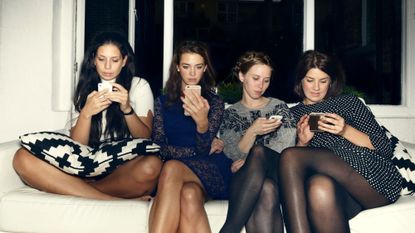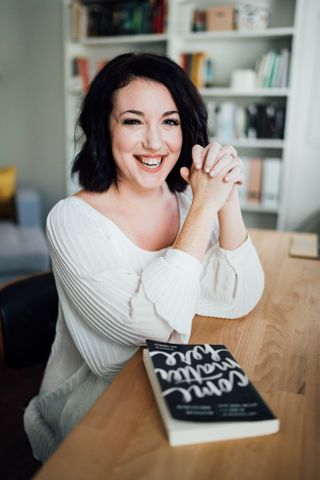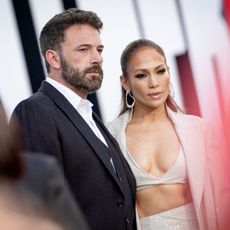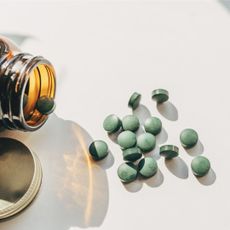Are you guilty of ‘phone snubbing’? Here’s how to rediscover connection in a digital world (and why you should)
Author and TED Talk speaker Hannah Brencher reveals how she learned to embrace vulnerability after disconnecting from social media


We’re living in an age of hyper-connectivity. It’s never been easier to keep in contact with people worldwide; yet, for many of us, genuine connection alludes to us.
It’s a feeling that Hannah Brencher, an author and TED Talk speaker, knows all too well. Brencher says the constant presence of our phones in daily life—a new term known as ‘phubbing’ or ‘phone snubbing’—is beginning to diminish meaningful conversations and the vital feeling of being closely connected.
Despite knowing that Instagram likes pale compared to an authentic compliment from someone you genuinely care about, many of us are guilty of ignoring the people who show up for us irl in favour of keeping up with the goings-on of random acquaintances and strangers. We watch intimate gigs through our phone screens, desperately trying to preserve life instead of simply experiencing it.
This constant connectivity left Brencher exhausted and disconnected from daily life. “I couldn’t shut off or be fully present for the people right in front of me,” she remembers. Drained and overstimulated, Brencher knew she needed to make a change.
Here, she gets honest about setting the goal to unplug for 1,000 hours in one year and what changes disconnecting made in her closest relationships.
By Hannah Brencher
On my 33rd birthday, I decided to turn off my phone—not as a one-time gesture or a 30-day experiment, but to reclaim my time and energy. The endless scrolling and constant accessibility had taken its toll on me, so I set a goal: 1,000 hours of unplugged time over the course of a year, which equates to three to four hours daily.
Marie Claire Newsletter
Celebrity news, beauty, fashion advice, and fascinating features, delivered straight to your inbox!
I wasn’t looking to disconnect entirely (tempting as it sounds), and I couldn’t give up my Facetime calls with my mum. However, I realised that my constant connectivity was causing me to miss out on something important. We often convince ourselves we’re not missing out because our phones keep us informed and connected. But I realised this “always on” mentality came at a cost. While I was plugged in, I was passing up the opportunity to be fully present with others, investing in my life, and experiencing the growth that comes from unfiltered, face-to-face interactions.

Author Hannah Brencher
Sherry Turkle, a leading voice in the conversation about technology’s impact on our lives, wrote, “Human relationships are rich and messy and demanding. We clean them up with technology, but in doing so, we sacrifice conversation for mere connection. We shortchange ourselves.”
Many of us fear that people might love the idea of us more than the reality of us.
That was my reality before I began unplugging. Especially after the pandemic, keeping people at a distance and connecting with them through a screen felt easier. But the more time I spent on my phone, the less I valued my in-person relationships. My therapist might say that the screen was a defence mechanism, allowing me to project the best version of myself while keeping others at arm’s length. In this hyperconnected age, many of us fear that people might love the idea of us more than the reality of us.
One of the first things I learned through unplugging is that honesty and vulnerability—though often intertwined—are not the same. It’s possible to be honest on social media, sharing glimpses of our lives, fears, and frustrations. Honesty is like opening the front door to let others peek inside.
The more time I spent on my phone, the less I valued my in-person relationships.
Vulnerability, however, goes a step further. It’s not just opening the door but inviting someone in, even when you feel you have nothing to offer. It’s being seen and known, even when things are unresolved and imperfect. I’ve found that this kind of vulnerability can’t be fully practiced online. It requires us to take off the mask, remove the filters, and be face-to-face.
During my unplugged year, I spent a weekend away with some close friends. We’ve been through it all together—engagements, marriages, babies, losses, moves, and more. The weekend was almost entirely unplugged due to a poor network, but I committed to staying present, resisting the urge to document everything, and just being in the moment.
We caught up in stages: first, the surface-level updates, then gradually moved to deeper topics as the conversation shifted to me. I wanted to keep things light and only share the good parts, but as they probed further, I began to disclose some mental health challenges I’d been facing. It was the first time I had revealed them, and I surprised myself as the words spilt out. Being fully present, without distractions, made me feel safe enough to be vulnerable. We talked, they asked thoughtful questions, and I began to see my situation differently as we peeled back the layers. I felt lighter and more hopeful and realised I didn’t have to go through it alone.
Life is too precious to spend it behind a screen.
The more I’ve unplugged, the more I’ve learned that vulnerability is essential for relationships to grow and thrive. Life is too precious to spend it behind a screen. We need real-life connections—people who will steer us in the right direction, open their arms and say, “Your truth doesn’t scare me. Tell me everything.”
I’m not saying it will be easy or perfect. When you open yourself up to needing others, there is always the risk of getting hurt. It’s often easier to stay behind our screens and keep things at surface level. But I’m afraid the fruit doesn’t grow on the surface—it requires depth, sometimes darkness, and then exposure to light to become rooted and immovable. There’s also something more authentic on the other side when we remove the filters, resist the need to edit, and let others into our true stories.
Hannah Brencher is a writer, TED Talk speaker, mental health advocate, and author. Her new book, The Unplugged Hours, is out on September 17th and can be pre-ordered now.

Mischa Anouk Smith is the News and Features Editor of Marie Claire UK.
From personal essays to purpose-driven stories, reported studies, and interviews with celebrities like Rosie Huntington-Whiteley and designers including Dries Van Noten, Mischa has been featured in publications such as Refinery29, Stylist and Dazed. Her work explores what it means to be a woman today and sits at the intersection of culture and style. In the spirit of eclecticism, she has also written about NFTs, mental health and the rise of AI bands.
-
 Jennifer Lopez wants to “make over her image” following Ben Affleck divorce
Jennifer Lopez wants to “make over her image” following Ben Affleck divorceBy Jenny Proudfoot
-
 The White Lotus cast's words about the upcoming season are going viral
The White Lotus cast's words about the upcoming season are going viralBy Jenny Proudfoot
-
 A landmark new Ozempic study claims the drug can "delay ageing" - but top experts warn it's not that simple
A landmark new Ozempic study claims the drug can "delay ageing" - but top experts warn it's not that simpleA deep dive.
By Ally Head